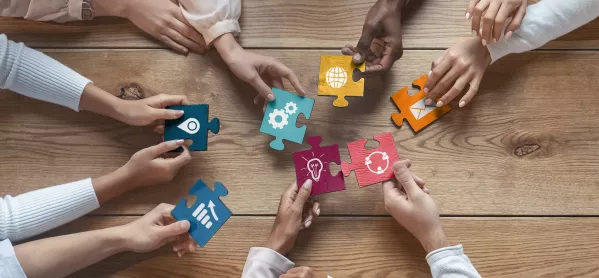5 ways to teach global citizenship and collaboration

Whether students were locked down in London or Lagos, millions of young people around the world experienced what it was like to have their learning disrupted and now understand, to some degree, what it means not to have free movement or access.
“The pandemic has created a unique window of insight into the global challenges that we all face,” says Carl McCarthy, executive headteacher at GLF Schools multi-academy trust.
And this is something he’s tried to delve into with his students, noticing the disparity in provision that some young people face nationally, as well as globally. But he has also been celebrating the staggering kindness, innovation and teamwork we’ve witnessed, and he has been harnessing the technology that brings together citizens in opposite corners of the world.
“In this new, post-Brexit, global-facing context, we have the opportunity for our students to build knowledge and understanding together with fellow students from around the world - all who have been facing similar challenges at the same time and all who have seen similar strengths in human spirit and the triumph of science and technology to offer solutions to some of the greatest problems that we have collectively faced,” says McCarthy.
The power of international school partnerships
This is something that students at GLF schools have been engaged in since long before the pandemic, through their partnerships between four schools in the UK and four schools in South Africa, via the Connecting Classrooms through Global Learning programme.
Related: What schools can gain from international partnerships
Further reading: 7 ways to bring an international ethos to school life
In case you missed it: How to use online partnerships to teach about climate change
Students have learned together by creating a collaborative art exhibition, virtual work through the Lyfta platform and trying out activities like Unicef’s “Wants and Needs”, in which students share their perspectives on their lives and wishes. The students recorded their answers and shared them with partners in South Africa, giving them insight into the lives of their contemporaries across the globe and introducing them to the UN Convention on the Rights of the Child.
They also shared music and songs. Students were particularly impressed by their partner Nceba School’s choir, which has been active since the schools first started collaborating in 2007 and continues to go from strength to strength.
Another activity involved children “recording the foods they ate over two weeks,” says McCarthy. “We plotted the results into spreadsheets to compare meals and look for trends. Our children were very surprised at the more balanced meals and significantly less sweet food from the children in our partner schools.”
Similarly, students at Stantonbury International School, in Milton Keynes, have been collaborating with schools overseas, as part of the Connecting Classrooms through Global Learning programme, for three years in an array of different projects to develop a sense of global citizenship and a collaborative spirit. Accredited with the International School Award, it also designed bookmarks with students in China and Germany, designed T-shirts with its Erasmus+ peers around Europe, and wrote letters to pen pals in Spain.
And during the periods of remote learning, students relished the opportunity to connect with their partner schools overseas to create a cookbook.
“The project was borne out of lockdown,” says Sandra Underwood, head of modern foreign languages and international co-ordinator at Stantonbury International School.
“As we were all home doing more cooking and spending time with family, we thought it was a great way to capture international cuisine. We wanted students and teachers to have an extended purpose to cooking and to share culture with one another. Especially as we were unable to socialise as normal.”
“Collaboration with others is important because it motivates and engages students,” says Underwood. “They can talk to, engage with and learn from others who are experiencing similar challenges but also share successes.”
At times of uncertainty or crises, focusing on global citizenship can offer us stability.
“It helps children understand who they are in the world,” says McCarthy. “[It shows] how being a citizen within a country is a positive, stronger position from which individuals can enact change. It helps them to develop a stronger sense of self, identity and belonging, and has a positive impact on mental health and wellbeing.”
McCarthy says by connecting with young people in other countries, he has seen a greater sense of empathy develop within his students. Through the bonds they develop, students build a sense of solidarity, as well as the resilience they need to take on tough tasks.
This sense of togetherness can drive young people to tackle complex issues. Whether it’s the 15 young climate activists who filed a lawsuit for global failures to protect children through environmental justice, or the 12 young people joining together to push for action on the global goals, young people are coming together to find their own solutions.

So how can we help students to see themselves as global citizens, and collaborate for a better world?
5 ways to enhance global citizenship within your school
1. Let the library take you around the world
Covid-19 may stop us travelling the world, but books can transport us anywhere. Try introducing stories from a range of continents, communities and cultures to your class. Carl McCarthy recommends The Boy at the Back of the Class and Journey to Jo’burg. Other teachers we spoke to recommended Harriet Tubman: A Journey to Freedom, Cinderella of the Nile, and this selection of social justice-themed books for children.
2. Start with a small project
Collaborations don’t need to be years long; start by co-creating something specific over a few weeks or months, just like the students at Stantonbury International School who created a cookbook with their partner schools. This enabled them to gain knowledge about other cultures and experience of collaborating outside of traditional classroom subjects.
Collaboration is a key skill that students need once they join the world of work, and in our increasingly interconnected world, providing them with the opportunity to collaborate on a global scale now may prove invaluable later.
3. Tackle global issues together
The Connecting Classrooms through Global Learning programme, which is funded by The British Council and UK Aid, joins together schools around the world. You could be partnered with a school thousands of miles away, like students at GLF schools who have been learning with students in Kenya and South Africa since 2007.
Students in these partnerships have learned about issues like plastic pollution and taking action together for cleaner oceans.
While travel is suspended, you can still partner with other schools online and conduct project work, and you can apply for a travel grant once restrictions are lifted. If you’re already in a partnership with an overseas school, you could apply for funding to support joint activities.
4. Reach every year group
Assemblies are a brilliant way to bring big ideas to the whole school. Unicef primary school assembly packs help the whole school to explore children’s rights together. With links to special days such as World Health Day or World Refugee Day, these assemblies are a great way to foster a rights-respecting ethos in your school. Connecting Classrooms lesson plans cover a wealth of topics, from renewable energy and rising sea levels, to gender equality and mental health. Suitable for all key stages, you’re sure to find an age-appropriate way to introduce students to global issues.
5. Stoke a debate
Tackle some of life’s “big questions” with students by teaching them how to debate, argue, share their views, identify disagreements and reach consensus around real-world challenges. In geography, you could debate whether natural resources like water should be owned. In history or economics, you could debate whether protectionism works, and in science, you could debate whether genetic engineering should be allowed.
You can find ideas for debates in the International Debate Education Association’s online database, the Debatabase.
Connecting Classrooms through Global Learning offers fantastic opportunities to work with an international partner school and make a difference on global issues such as climate change, plastic pollution, pandemics, gender equality and many more. Our local advisers can help you to get your collaboration started with free support, online training and resource packs to make your projects world-class. For schools wishing to go the extra mile, there is even partnership funding to make your ideas a reality.
